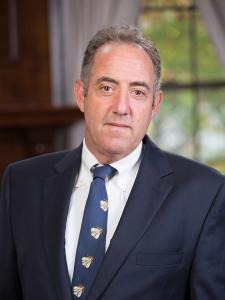
Interposed between criminal law and psychiatry are forensic psychiatrists, doctors who assess whether defendants are currently mentally competent to stand trial. Some of their work involves consulting on legal insanity cases, in which the forensic psychiatrist performs a retrospective evaluation to decide, based on long-established state and federal laws, whether the defendant was so impaired by mental illness at the time of the act that the jury or judge should find them not criminally responsible.
Psychiatric evaluations can sway the outcome of a case — and the life of the person on trial. “You want the person to have a clinically accurate and just outcome,” says David Rosmarin ’74, the director of the Forensic Psychiatry Service at McLean Hospital in Boston.
Rosmarin has spent his career evaluating the mental states of those charged with crimes, including murder. A fraction of murder defendants use the insanity defense, and these cases have high stakes. It’s Rosmarin’s job to discern the true basis of the killing through videotaped, face-to-face examinations and convey it to the jury. It’s similar to those scenes in Law and Order, but there’s a key difference in how he conducts himself in these situations: impartiality. In forensic psychiatry, the doctor performs an unbiased evaluation for legal purposes, not treatment.
“The guiding principle in forensic psychiatry is truth telling,” Rosmarin says. “You try to understand what happened and tell the truth about it, irrespective of whether you’re working for the prosecution or the defense.”
The insanity defense is used in about 1% of felony cases and rarely succeeds in murder trials. Still, some alleged murderers feign insanity to stave off harsh charges, while others with true mental illness kill for nonpsychotic reasons. Having conducted more than 150 psychiatric evaluations of murderers to determine if they are legally insane, Rosmarin says it’s rare for someone with no mental illness to malinger successfully, but it’s more challenging to assess whether those with true serious mental illness are exaggerating.
The work can be grueling, with people confessing how they carried out heinous crimes — and their thoughts before, during, and after — to Rosmarin. “It’s a sad business,” he says. But that sadness is softened, in part, by his role teaching Harvard Medical School students and residents. In a specialized field like Rosmarin’s, educating the next generation on a nuanced discipline like psychiatry is paramount. He cherishes the moments when he’s teaching a difficult concept, like an interviewing technique, and it clicks for his students. “I enjoy their energy,” he says.
When the neuroscience major was a student himself, he leaned on the teachings of Colgate luminary Jerry Balmuth to learn about philosophy, opening his mind to concepts like ethics that aid in his work today. Upon leaving the Hill, Rosmarin earned his medical degree from Boston University, spending his chief residency year at Harvard Law School.
Before taking his post at McLean — and after 10 years at Massachusetts General Hospital — Rosmarin spent a decade consulting on psychiatric assessments of a very different subset: world leaders. Most of the information about his work with the CIA is classified, but he says he primarily assessed how various world leaders would likely react in a range of circumstances. However, Rosmarin emphasizes that he was never involved with assessing detainees. “Such CIA ethical breaches were performed by psychologists and physical medicine MDs, not psychiatrists,” he says.
Rosmarin’s findings aided United States officials to make decisions based on psychiatric assessment, not just their gut instinct. “It’s difficult to piece together an assessment of somebody whom you’re not examining directly,” he says. “You try to be very careful to give an appropriate level of confidence to your assessments. Decision makers don’t care about psychiatric peccadilloes, they care about what will affect the U.S.”
At the root of it, Rosmarin works in psychiatry for the reason many people enter the medical field — it’s compelling. His work in high-stakes criminal cases is no different. “One of the reasons I do this is because, in genuine cases, it’s a way of protecting people with serious mental illness from what society has said since the 1700s in England: We don’t punish people who we don’t think are morally culpable and, therefore, aren’t legally culpable.”
